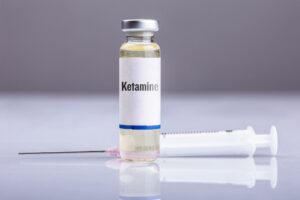Ketamine therapy is a relatively new treatment for PTSD that is showing promising results. Ketamine is a medication that has been used for years to help people with depression, and it was recently found to be helpful in treating PTSD as well. In this blog post, we will discuss what ketamine therapy is, how it works, and who can benefit from it.
Contents
What Is Ketamine Therapy?
Ketamine therapy is a revolutionary treatment option for people with depression, PTSD, and other mental health disorders. It works by using ketamine, a medication that has been used in anesthesia since the 1960s. And to interact with brain chemistry and help improve symptoms of depression, anxiety, mood swings, pain, and more.
Unlike traditional antidepressants like SSRIs, ketamine therapy works quickly and is often effective within hours of the first dose. It works on a different receptor than traditional antidepressants. That can be beneficial for patients who have had limited success with other medications.
When administered in the right dosage, under the supervision of an experienced clinician, ketamine can provide profound relief from symptoms that have long resisted treatment. It is important to understand the risks and benefits of ketamine therapy before undergoing treatment. As it can be a powerful tool for managing depression and other mental health issues.
Is Ketamine Therapy For PTSD Helpful?
Yes, ketamine therapy may be beneficial for people suffering from post-traumatic stress disorder (PTSD). Studies have shown that ketamine can reduce symptoms of PTSD. In fact, a systematic review found that one session of ketamine infusion produced “clinically meaningful” improvement in symptoms of PTSD.
Ketamine therapy has also been found to be effective in treating comorbid conditions associated with PTSD, such as depression and anxiety. In one study, participants who received a single dose of ketamine experienced significant reductions in both depressive and anxiety symptoms.
Ketamine may be especially beneficial for people who do not respond to other treatments for PTSD. A study of veterans with chronic, treatment-resistant PTSD found that ketamine produced clinically significant improvements in symptoms compared to a placebo.
While the evidence is promising, more research is needed before ketamine can be considered an effective long-term treatment for PTSD. That said, many people suffering from this condition have found relief from symptoms through ketamine therapy. And it may be worth exploring for those who have not responded to other treatments.
How Does Ketamine Therapy For PTSD Work?
 Ketamine therapy for PTSD works by activating areas of the brain that have been suppressed in those with PTSD. Ketamine is thought to normalize glutamate levels in the brain, stimulating a range of areas including:
Ketamine therapy for PTSD works by activating areas of the brain that have been suppressed in those with PTSD. Ketamine is thought to normalize glutamate levels in the brain, stimulating a range of areas including:
- the prefrontal cortex
- hippocampus
- amygdala
This allows for improved communication between these areas, allowing for greater emotional regulation and processing. The antipsychotic effects of ketamine help to reduce symptoms associated with PTSD. Such as intrusive memories, flashbacks, nightmares, and avoidance behaviors. The drug also helps to reduce stress hormone levels in the body.
With regular treatment sessions over a period of time, those with PTSD can learn new coping mechanisms and healthy ways to manage their symptoms effectively.
What Benefits You Can Expect With It?
When considering ketamine therapy for PTSD, the overwhelming benefit is the fast-acting relief it may offer. A few common benefits are listed below:
- Reduced Symptoms: The very obvious benefit is the reduction in symptoms of PTSD. A key benefit of ketamine therapy for PTSD is that it can provide relief from intrusive thoughts, flashbacks, and other psychological traumas associated with the disorder.
- Reduced Anxiety & Depression: Many people who use ketamine for PTSD experience a decrease in anxiety & depression levels as well. This could provide a great deal of relief to someone who has been dealing with the effects of trauma for years.
- Improved Sleep: One of the key benefits associated with ketamine therapy for PTSD is improved sleep. Sleep disturbances are common in traumatized individuals. So the ability to regulate and improve sleep habits can be quite significant.
- Improved Cognition: Those who use ketamine therapy for PTSD often report an increase in cognitive functioning, such as better memory and concentration. This could help someone return to their normal life and daily activities more quickly.
- Improved Quality of Life: Ultimately, with all of these combined benefits, there is great potential for an improved quality of life with ketamine therapy for PTSD. This could involve being able to engage in activities or hobbies that were previously too difficult due to the symptoms of the disorder.
Overall, ketamine therapy for PTSD could provide an effective, fast-acting solution to a complex disorder. If you are considering using it as part of your treatment plan, speak to your healthcare provider. And do some research to make sure you are making the best decision for yourself.
What Are The Risks Associated With Ketamine Therapy For PTSD?
While the therapy has been proven to be effective, there are still risks associated with ketamine therapy for PTSD. Some of these might include:
1. Psychological risks: Ketamine has the potential to induce anxiety, confusion, and depression. In some cases, these adverse reactions can be severe and require medical attention. It’s important to note that emotional distress due to flashbacks of a traumatic event is also possible while under ketamine therapy.
2. Physical risks: Common physical reactions include nausea, vomiting, and an increase in blood pressure or heart rate. In rare cases, there may be a risk of short-term respiratory depression which can be serious if left untreated.
3. Addiction risk: The potential for addiction is a concern when it comes to many medications but particularly those that are known to interact with the brain in a certain way, such as ketamine. Patients should be sure to discuss any prior substance abuse issues or mental health concerns with their doctor before beginning treatment.
Overall, there is still much to learn about the risks associated with ketamine therapy for PTSD. So, it’s important that those considering the treatment speak with their doctor about the potential risks and benefits before making any decisions. With careful consideration and monitoring, ketamine therapy can provide relief to those suffering from PTSD in a safe and effective manner.
When Is Ketamine Therapy Not Considered?
 PTSD is a complex condition, and ketamine therapy may not be the best option for everyone. Here are some situations or conditions where ketamine therapy may not be an ideal option when:
PTSD is a complex condition, and ketamine therapy may not be the best option for everyone. Here are some situations or conditions where ketamine therapy may not be an ideal option when:
- Dealing with significant substance abuse issues.
- An individual has significant medical problems, such as a recent heart attack or stroke.
- For individuals who have a history of psychosis, such as schizophrenia or bipolar disorder.
- When the individual is pregnant, breastfeeding, or trying to become pregnant.
- For those who have allergies to ketamine or any other medications used in the treatment.
- Significant risk of abuse of the medication by the individual taking it.
- Underlying psychiatric disorder that has not been properly diagnosed or treated.
- Symptoms of PTSD are milder and other treatment options have been exhausted.
In any of these situations, it is important to discuss all your options with a healthcare provider before moving forward with ketamine therapy. They can help you evaluate the risks and benefits of your particular situation and determine if this treatment is the best choice for you. Also, in these cases, other forms of treatment for PTSD may be more appropriate.
Be sure to ask your healthcare provider any questions you may have about ketamine therapy before beginning treatment. You should also keep your doctor informed of any changes in symptoms or side effects during the course of treatment. With the right care, ketamine therapy can be a safe and effective option for those suffering from PTSD.
Conclusion
To conclude, ketamine therapy for PTSD is thought to be very promising and is currently being studied in clinical trials. While it has shown some positive results, more research is needed to determine the long-term safety and efficacy of ketamine for treating PTSD. Even so, ketamine therapy may provide a much-needed breakthrough in the treatment of this difficult disorder.
While there is still much work ahead to understand the full potential of ketamine therapy, it is likely to remain a promising option for treating PTSD in the near future. Additionally, further research into the use of other drugs could open up even more opportunities for effective treatments.
For more information, please contact MantraCare. PTSD or Post-Traumatic Stress Disorder is a mental health condition that affects people who have experienced or witnessed a traumatic event. If you have any queries regarding Online PTSD Counseling experienced therapists at MantraCare can help: Book a trial PTSD therapy session


